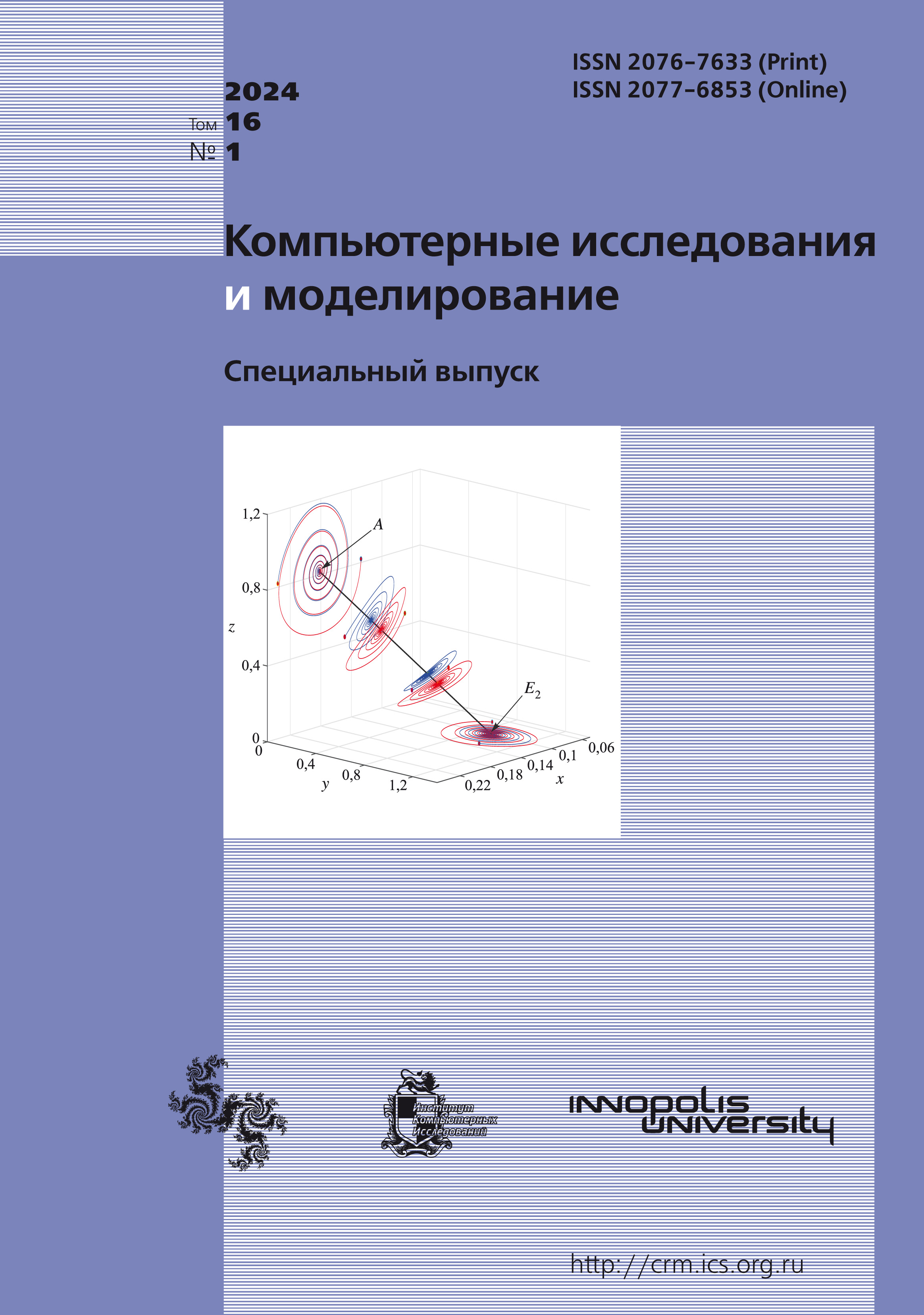All issues
- 2024 Vol. 16
- Issue 1 (special issue)
- 2023 Vol. 15
- 2022 Vol. 14
- 2021 Vol. 13
- 2020 Vol. 12
- 2019 Vol. 11
- 2018 Vol. 10
- 2017 Vol. 9
- 2016 Vol. 8
- 2015 Vol. 7
- 2014 Vol. 6
- 2013 Vol. 5
- 2012 Vol. 4
- 2011 Vol. 3
- 2010 Vol. 2
- 2009 Vol. 1
-
Modified Gauss–Newton method for solving a smooth system of nonlinear equations
Computer Research and Modeling, 2021, v. 13, no. 4, pp. 697-723In this paper, we introduce a new version of Gauss–Newton method for solving a system of nonlinear equations based on ideas of the residual upper bound for a system of nonlinear equations and a quadratic regularization term. The introduced Gauss–Newton method in practice virtually forms the whole parameterized family of the methods solving systems of nonlinear equations and regression problems. The developed family of Gauss–Newton methods completely consists of iterative methods with generalization for cases of non-euclidean normed spaces, including special forms of Levenberg–Marquardt algorithms. The developed methods use the local model based on a parameterized proximal mapping allowing us to use an inexact oracle of «black–box» form with restrictions for the computational precision and computational complexity. We perform an efficiency analysis including global and local convergence for the developed family of methods with an arbitrary oracle in terms of iteration complexity, precision and complexity of both local model and oracle, problem dimensionality. We present global sublinear convergence rates for methods of the proposed family for solving a system of nonlinear equations, consisting of Lipschitz smooth functions. We prove local superlinear convergence under extra natural non-degeneracy assumptions for system of nonlinear functions. We prove both local and global linear convergence for a system of nonlinear equations under Polyak–Lojasiewicz condition for proposed Gauss– Newton methods. Besides theoretical justifications of methods we also consider practical implementation issues. In particular, for conducted experiments we present effective computational schemes for the exact oracle regarding to the dimensionality of a problem. The proposed family of methods unites several existing and frequent in practice Gauss–Newton method modifications, allowing us to construct a flexible and convenient method implementable using standard convex optimization and computational linear algebra techniques.
-
A gradient method with inexact oracle for composite nonconvex optimization
Computer Research and Modeling, 2022, v. 14, no. 2, pp. 321-334In this paper, we develop a new first-order method for composite nonconvex minimization problems with simple constraints and inexact oracle. The objective function is given as a sum of «hard», possibly nonconvex part, and «simple» convex part. Informally speaking, oracle inexactness means that, for the «hard» part, at any point we can approximately calculate the value of the function and construct a quadratic function, which approximately bounds this function from above. We give several examples of such inexactness: smooth nonconvex functions with inexact H¨older-continuous gradient, functions given by the auxiliary uniformly concave maximization problem, which can be solved only approximately. For the introduced class of problems, we propose a gradient-type method, which allows one to use a different proximal setup to adapt to the geometry of the feasible set, adaptively chooses controlled oracle error, allows for inexact proximal mapping. We provide a convergence rate for our method in terms of the norm of generalized gradient mapping and show that, in the case of an inexact Hölder-continuous gradient, our method is universal with respect to Hölder parameters of the problem. Finally, in a particular case, we show that the small value of the norm of generalized gradient mapping at a point means that a necessary condition of local minimum approximately holds at that point.
-
On Accelerated Methods for Saddle-Point Problems with Composite Structure
Computer Research and Modeling, 2023, v. 15, no. 2, pp. 433-467We consider strongly-convex-strongly-concave saddle-point problems with general non-bilinear objective and different condition numbers with respect to the primal and dual variables. First, we consider such problems with smooth composite terms, one of which has finite-sum structure. For this setting we propose a variance reduction algorithm with complexity estimates superior to the existing bounds in the literature. Second, we consider finite-sum saddle-point problems with composite terms and propose several algorithms depending on the properties of the composite terms. When the composite terms are smooth we obtain better complexity bounds than the ones in the literature, including the bounds of a recently proposed nearly-optimal algorithms which do not consider the composite structure of the problem. If the composite terms are prox-friendly, we propose a variance reduction algorithm that, on the one hand, is accelerated compared to existing variance reduction algorithms and, on the other hand, provides in the composite setting similar complexity bounds to the nearly-optimal algorithm which is designed for noncomposite setting. Besides, our algorithms allow one to separate the complexity bounds, i. e. estimate, for each part of the objective separately, the number of oracle calls that is sufficient to achieve a given accuracy. This is important since different parts can have different arithmetic complexity of the oracle, and it is desired to call expensive oracles less often than cheap oracles. The key thing to all these results is our general framework for saddle-point problems, which may be of independent interest. This framework, in turn is based on our proposed Accelerated Meta-Algorithm for composite optimization with probabilistic inexact oracles and probabilistic inexactness in the proximal mapping, which may be of independent interest as well.
Indexed in Scopus
Full-text version of the journal is also available on the web site of the scientific electronic library eLIBRARY.RU
The journal is included in the Russian Science Citation Index
The journal is included in the RSCI
International Interdisciplinary Conference "Mathematics. Computing. Education"





